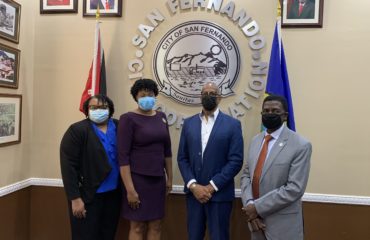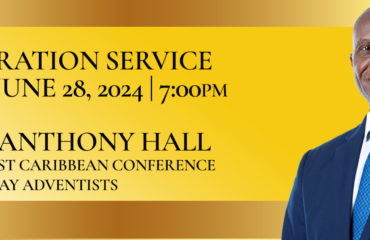By Hayden McKenna
There is a disarming aura of selfless confidence that he radiates when you meet him. There is this inviting availability and a very-felt sense of fellowship that warns you that this experienced leader does not require the safety of aloofness, power distance and a closed door to persuade anyone that he is at work and in charge. He is Mr. Dexter Riley, Chief Executive Officer of United Independent Petroleum Marketing Company Limited (Unipet). Mr. Riley graciously self-identifies as an alumnus of the University of the Southern Caribbean. He was a member of one of the several cohorts of professionals who read for the Andrews University Master of Business Administration degree taught and proctored on the campus of Caribbean Union College, now the University of the Southern Caribbean. He recalls the experience of studying on the USC Main Campus as very significant in preparing him for his leadership praxis. His parents, particularly his mother – to whom he refers as his “north star” – raised him with good values and laid a solid moral foundation for him. He credits his experience studying for an MBA on a Christian campus as building upon that foundation. He points out that a most valuable feature of the MBA programme was what he describes as the “sewing and integration of ethics into business”. It’s a perspective that he says he has been able to “cling to in difficult times enabling him to choose right even when tempted to do wrong”.
Mr. Riley has an unusual and quite interesting perspective on what constitutes good leadership. He is persuaded that leadership is a timeless virtuous force that exists separate, above and independent of mortal individuals:
We will always have leadership. Leadership is an entity that transcends time and space. As individuals, we all at some point in our lives, in different capacities… get called to leadership. We occupy that space for a time and we have the responsibility to facilitate our replacement in leadership… There has always been leadership from the beginning of time.
In Mr. Riley’s reckoning, the debate over the question of whether leaders are born or made, seems far less useful than preparing oneself and others to be able to respond with readiness to the transcendent call to and duty of leadership. Leadership never becomes the chattel of the current leader and should never be regarded as such.
For Mr. Riley, leadership is about “satisfying a purpose and a cause”. The nature and focus of the leadership that we are called to practice is shaped by the purpose and the cause to be satisfied whether it is in business, religion, government, the public sector, civil society, the community, or the family and domestic sphere. Whatever sphere of leadership one is called to and the nuanced nature of the leadership needed there, the outcome of all good leadership according to Mr Riley is “improving the lives of others”.
Leaders are not called to be all-wise know-it-alls. As important as captains are in team sports, they seldom play all the positions on the pitch, court or field and even if they can, they can never do so at the same time. Captains inspire, enable and empower. For Mr. Riley, “a good leader does not need to have all of the technical skills… leadership is about enabling talent to create value and deliver a quality experience to stakeholders”.
Serving people is central to Mr. Riley’s leadership approach. While there are some leaders who put policies and procedures before people, Mr. Riley, without negating the value of good policies and procedures, argues that authentic leadership provides structures to enable people. With a quip of rhetorical levity, he says “I have never seen anybody lead a policy. I have never seen anybody lead a procedure.” Authentic leadership is focussed on “improving the lives of people. It is not about improving the lives of equipment or money. Those are tools, those are resources that serve a certain purpose – improving the lives of people”.
Mr. Riley, in describing his own preparation for the call of leadership, credits the invaluable active mentorship and examples of stellar leadership he received from persons such as Mr. Ernest Williams, Mr. Edmund Arneaud, Mr. Ian Thomas and Mr. John Gransaull. They were leaders who saw his potential, embraced him, and provided him with guidance. He also holds in very high esteem the continuing examples of outstanding commitment to ethical leadership modelled by persons like Mr. Winston Romany, Dr. Afraz Ali, Mr. Hayden Toney and the members of the Board of Directors of Unipet. He also credits what can perhaps be aptly described as the ‘passive mentorship’ he received or extracted from observing good leaders at work and emulating their strengths. Reading and studying about the triumphs and failures of other leaders near and far abetted this well. For him, leaders must study other leaders. Being overly absorbed with navel-gazing can be a debilitating obstacle to growth.
Mr. Riley also highly values the example of moral living instilled by his parents and his formal educational journey as important sources of his preparation for leadership. As a youngster, Mr. Riley migrated to the United States along with his parents and siblings. It was there he began his formal education and went through the stages of kindergarten and elementary school, at a time when it was not always a bed of roses for immigrant families – especially those of colour. With the untimely death of his father, his mother took the decision to bring the family back home to Trinidad and Tobago. Here Mr. Riley completed his secondary education with an emphasis in the sciences and went on to university to pursue an undergraduate degree in Mechanical Engineering at the UWI.
Mr. Riley’s preparation for leadership was also facilitated by the impressive career he has had. As a young graduate, he began his career at Trinidad and Tobago National Petroleum Marketing Company Limited (NP) as a Junior Engineer. At NP, he rose through various positions to become the Head of NP’s Tobago operations. His pursuit of continuing education in Computer Systems Design, an MBA with an emphasis in Finance and International Marketing and an Advanced Diploma in HSE among other things, improved the value he brought to the workplace.
Desiring a different experience, he then moved on to Trinidad Cement Limited (TCL Group of Companies). The story is that he applied for the position as Business Analyst, but was hired as General Manager of a start-up, TCL Trading. This job required him to re-locate to Anguilla where he spent the next six years. This job among other things, carried with it the responsibility for the TCL Group’s penetration into the CARICOM export market. It impressed upon his career a regional focus. He travelled throughout the CARICOM territories, networking and building relationships with business leaders and developing an understanding of the region’s cultural diversity.
Mr. Riley later joined the ASCO Group of Companies (a global oil and gas logistics company) as Director of Operations. He would later be promoted to the position of General Manager of ASCO Trinidad and Tobago. Working in leadership positions in the ASCO group also brought opportunities for Mr. Riley to work overseas in different cultural contexts. He did stints in Scotland in the United Kingdom and in Tanzania, East Africa. The latter assignment involved working in a multi-user facility comprising of a number of multi-national companies engaged in offshore drilling for oil in Africa. The complexity and dynamism this leadership situation involved is difficult to overstate – a foreign environment, ASCO’s interests, the corporate cultures of other multinational partners, best practice for safe work and environmental security, the interests of the host government, and a miscellany of other stakeholder interests are considerations that help to frame the big-ticket concerns that leadership in this context required. Mr. Riley modestly refers to this assignment as a “very soul-shaping experience”. A product of the Afro-Caribbean Diaspora leading mostly European expatriate managers in an extractive business enterprise on the continental homeland of his ancestors had to be at its very minimum “very soul-shaping”!
Being married and being a father and having a deep loyalty to family, imposed boundaries on Mr. Riley’s endurance for this highly rewarding leadership assignment in Tanzania. “At that point in time I was married and I had some kids and I didn’t really want to be an absentee father… I took the decision that I would return home.”
After returning home Mr. Riley established his own business, IOGL and entered the field of consultancy. During this period, his paths crossed with a head-hunter working for Unipet that was looking for someone to fill the position of CEO. “The conversation happened…and I decided I would give it a shot.”
It is evident that Mr. Riley’s life and career journeys have provided him with rich opportunities to absorb, distil and share from an acquired treasure trove of leadership wisdom. Here is a miscellany of byte-sized (deliberate spelling) leadership insight he shared with me:
“The most important aspect of leadership preparation is about falling and getting back up… being in a place where there is no way and finding a way.” It is at those difficult times that humility, innovation and determination can thrive, some of the best relationships can be formed and the honesty of your values can be rigorously tested and clarified. “It is in the trenches when there can be despair but instead you find peace and joy and come to understand that difficulty comes before resurgence, that leadership character is truly developed. In leadership you need the experience of failure.”
“If you want to have good ethical leadership, you must have memory, living memory of doing right and being kind even when it is not easy to do so.” Mr. Riley is persuaded that leaders must practice righteousness, kindness and fairness even in seemingly small matters so that they are always ready and well-rehearsed to lead with integrity.
“An authentic leader prepares others to replace him or her.” The progressive leader uses projects and work as opportunities to develop people. “You get people involved and provide them with the opportunity to contribute to shaping decisions.” You plan and organize work in ways that create opportunities for your people to shine.
Future-conscious leaders “love the generation to come”. They do what they can to make that generation better than they are. “They put things in place – the savings the sacrifices so that that new generation could be better and go further.” The future-conscious leader intentionally passes on the strategic relationships he or she has developed over the years to the future leaders under his or her charge:
Young potential leaders must build relationships. They need to be given the opportunity to take over the relationships of the current leader, so when they come into full leadership, they have the support of those relationships. A leader is not a superhero who just somehow wherever he or she goes, he or she gets things done and without him or her everybody is in trouble – that is for the movies. Leadership is really about how we can harness resources respectfully.
The good leader is adept at mobilizing the support of others. It is obvious that there is no leader without the support of the led. Mr. Riley lists “having the support of others” as one of his greatest accomplishments. He is however extraordinarily elastic in his definition of support. Stretching way beyond the obvious edges of friendliness, co-operation and even non-adversarial co-existence, Mr. Riley sees wrong-doers and challengers as supporters too. Because of them:
you get to know what wrong looks like… they are some of your greatest supporters, except that they may not be aware of it, or it might not be intentional. I do not know which life was lived without challenge – even Jesus’. There is something about us challenging each other – sometimes in ways that could be painful – it is part of a bigger plan, otherwise it would not persist through time and space…
He argues that without challenge we cannot grow, flourish and innovate. If we do not experience the wrong-doer, how can we know how others feel when we do wrong?
The good leader is a nurturer and exemplar of sound corporate culture. “When you are in the limelight of any situation people take their cue from what you do and what you say.” Does the leader care? Does the leader display empathy? Does the leader exemplify excellence? Does the leader model corporate values and hold others accountable to do the same? Mr Riley shares that at Unipet whenever they convene a management team meeting, they pray for the organization and discuss their values in action: “How did we see our values being upheld or not upheld today or yesterday or around some project?” is among the questions posed for intentional introspection. Of the growth of AI Mr. Riley said that the only time you need to be afraid of any innovation – fire or a knife is when it is used without ethics. “When we use fire ethically, we cook food, the greatest meals, we bring joy, we have weddings. When we use a knife unethically, we end people’s lives or we change them for the worse. Artificial Intelligence gives us the capacity to create more value faster. It has the potential to level the playing field in some areas. It can bring resources and services to those who in many instances could not afford it before. Would AI be used unethically? Of course it would! But its value far outweighs its mischief.
On the challenge of 21st century patterns of work and the apparent waning capability of firms to lock-in talent for the long-term, Mr. Riley argues that “when people leave your organization, it does not mean that they are disloyal. When people leave the organization, they and their new organization can sometimes become new customers. They can become someone who can share ideas on how you can do things differently because they are in a different space with a different perspective. They may even introduce you to new customers and new markets… It is evolution. It is not necessarily a bad thing. To sum this up, he paraphrases from the wisdom of American contemporary philosopher and thought-leader the late Wayne Walter Dyer: “If you change the way you look at things, the things you look at change.”
To future and aspirant leaders Mr. Riley counsels that studying good leaders who have walked exemplary paths and learning from their triumphs, failures and their commitment to improve the circumstances of the people they serve, is a worthy endeavour. “You want to achieve something? Look to the person who has walked the road before in the way that you want to walk it.” Mr. Riley concluded with these sober words:
Leadership is an entity of its own that calls us to serve. But it selects those who are willing to be humble to learn to be selfless. Without humility and selflessness, you will not have authentic leaders. You will only have people grabbing at power for themselves and at the end of their journey, regretting it because they would have acquired a set of things that they have no use for and a lot of hurt as their legacy.




